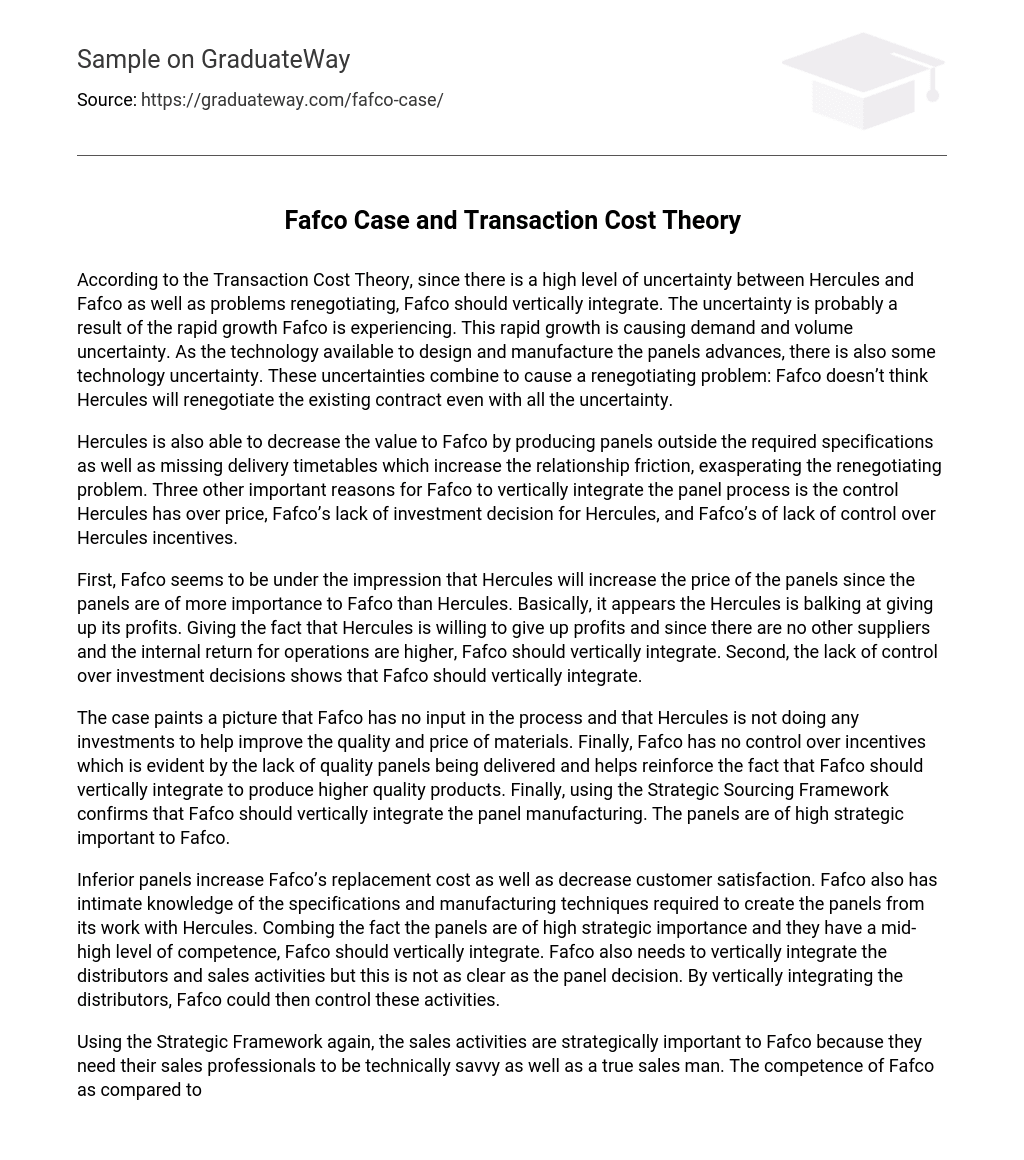According to the Transaction Cost Theory, since there is a high level of uncertainty between Hercules and Fafco as well as problems renegotiating, Fafco should vertically integrate. The uncertainty is probably a result of the rapid growth Fafco is experiencing. This rapid growth is causing demand and volume uncertainty. As the technology available to design and manufacture the panels advances, there is also some technology uncertainty. These uncertainties combine to cause a renegotiating problem: Fafco doesn’t think Hercules will renegotiate the existing contract even with all the uncertainty.
Hercules is also able to decrease the value to Fafco by producing panels outside the required specifications as well as missing delivery timetables which increase the relationship friction, exasperating the renegotiating problem. Three other important reasons for Fafco to vertically integrate the panel process is the control Hercules has over price, Fafco’s lack of investment decision for Hercules, and Fafco’s of lack of control over Hercules incentives.
First, Fafco seems to be under the impression that Hercules will increase the price of the panels since the panels are of more importance to Fafco than Hercules. Basically, it appears the Hercules is balking at giving up its profits. Giving the fact that Hercules is willing to give up profits and since there are no other suppliers and the internal return for operations are higher, Fafco should vertically integrate. Second, the lack of control over investment decisions shows that Fafco should vertically integrate.
The case paints a picture that Fafco has no input in the process and that Hercules is not doing any investments to help improve the quality and price of materials. Finally, Fafco has no control over incentives which is evident by the lack of quality panels being delivered and helps reinforce the fact that Fafco should vertically integrate to produce higher quality products. Finally, using the Strategic Sourcing Framework confirms that Fafco should vertically integrate the panel manufacturing. The panels are of high strategic important to Fafco.
Inferior panels increase Fafco’s replacement cost as well as decrease customer satisfaction. Fafco also has intimate knowledge of the specifications and manufacturing techniques required to create the panels from its work with Hercules. Combing the fact the panels are of high strategic importance and they have a mid-high level of competence, Fafco should vertically integrate. Fafco also needs to vertically integrate the distributors and sales activities but this is not as clear as the panel decision. By vertically integrating the distributors, Fafco could then control these activities.
Using the Strategic Framework again, the sales activities are strategically important to Fafco because they need their sales professionals to be technically savvy as well as a true sales man. The competence of Fafco as compared to the network of sales/distributors is also high. Since Fafco’s competence is high as well as the strategic value of the sales, they should integrate. What makes the decision to vertically integrate slightly more vague than the panel decision is that their network is already providing competent service.
Furthermore, Fafco already has control over the pricing and investment decision of their dedicated distributors. Even though their network is providing the necessary service, by bring the activity in-house will allow more control and supervision to ensure the most value is being created for the firm and its customers. The logic behind both decisions is similar in that the value and benefits they create or destroy for Fafco are paramount to the decision. Both decisions also rely on determining who has the power with regard to investments, incentives and pricing for the strategic activity of the firm.
The competence of the activity is also important when considering integration for both decisions. Not only Fafco is trying to determine how vertical integration will increase value for the firm but what risk that decision has. For instance, there is more risk with the integration of solar panels. If the endeavor fails, there are no other manufacturers that can meet Fafco’s need since Hercules will discontinue production. Sales and distribution can always be outsourced to the large network of dealers and wholesalers if integration fails and is less risky.





